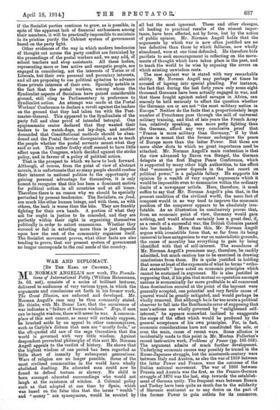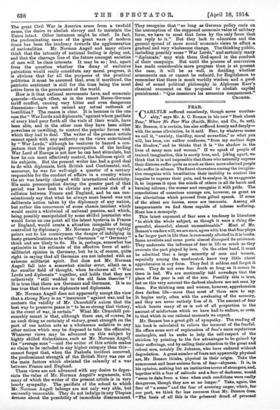M R. NORMAN ANGELL'S new work, The Founda- tions of International
Polity (William Heinemann, 3s. 6d. net), consists of a series of brilliant lectures, delivered to audiences of very various types, in which the arguments and conclusions set forth in his former work, The Great Illusion, are enforced and developed. Mr. Norman Angell's case may be thus summarily stated. He thinks, with Mr. Boner Law, that the occurrence of war indicates a " failure of human wisdom." Ergo, if men can be taught wisdom, there will never be war. A common- place of this sort cannot, as many will certainly suppose, be brushed aside by an appeal to other commonplaces, such as Carlyle's dictum that men are " mostly fools," or the oft-quoted old saw of the sage Oxenstiern that the
i
world is governed with very little wisdom. Against despondent proverbial philosophy of this sort Mr. Norman Angell appeals to the verdict of history. He shows that the highest wisdom of one period has been regarded as little short of insanity by subsequent generations. Wars of religion are no longer possible. Some of the most civilized communities in the world have wholly abolished duelling. No educated man could now be found to defend torture or slavery. No child is born amongst educated surroundings who would not laugh at the existence of witches. A Colonial policy such as that adopted at one time by Spain, which was based on the false idea that the terms " wealth " and "money" are synonymous, would be scouted by all but the most ignorant. These and other changes, all leading to practical results of the utmost impor-
tance, have been effected, not by force, but by the action of public opinion. Mr. Norman Angell holds that the arguments by which war is now often justified are no less defective than those by which fallacies, now wholly
abandoned, were at one time defended. He therefore bids pacifists to seek encouragement in reflecting on the move- ments of thought which have taken place in the past, and to teach the world to be wise by exposing the errors on which existing unwisdom rests.
The case against war is stated with very remarkable ability. Mr. Norman Angell may perhaps at times be
accused of lapsing into special pleading. For instance,
the fact that during the last forty years only some eight thousand Germans have been actually engaged in war, and
that these fought against naked savages in Africa, can scarcely be held seriously to affect the question whether the Germans are or are not " the most military nation in Europe." Neither do the facts that a proportionately large number of Frenchmen pass through the mill of universal military training, and that of late years the French Army has, relatively speaking, seen more petty fighting than the German, afford any very conclusive proof that "France is more military than Germany," if by that
phrase is meant that the former endangers the peace of Europe more than the latter Power. But these are mere °biter dicta to which no great importance need be attached. Mr. Norman Angell's main contention is that
the view advanced by Baron von Stengel, the German delegate at the first Hague Peace Conference, which is supported by many other high authorities, to the effect that "economic power depends in the last resort on political power," is a palpable fallacy. He supports his opinion by a wealth of very cogent arguments which it
would be impossible even to summarize within the ordinary limits of a newspaper article. Here, therefore, it must
suffice to say that Mr. Norman Angell's plea that, in the present condition of the civilized world, the mere fact of conquest would in no way tend to improve the economic position of the conqueror appears to be absolutely irre-
futable. As an illustration he conclusively proves that, from an economic point of view, Germany would gain
nothing, and would almost certainly lose a great deal, if,
as a result of a successful war, the British Colonies passed into her bands. More than this, Mr. Norman Angell
argues with irresistible force that, so far from its being immoral to bane antagonism to war on materialistic grounds, the cause of morality has everything to gain by being identified with that of self-interest. The soundness of Mr. Norman Angell's premisses may, therefore, be readily admitted, but much caution has to be exercised in drawing conclusions from them. He is quite justified in holding that some at least of the exponents of what he terms " ortho- dox statecraft" have acted on economic principles which cannot be sustained in argument. He is also justified in
supposing that, if his plea that mutual co-operation amongst nations is economically far more profitable to all concerned than domination secured at the point of the bayonet were
generally accepted, one potential and very fertile cause of quarrel would be greatly mitigated, and would perhaps be wholly removed. But although he is far too acute apolitical
observer to fall into the Benthamite error of supposing that men's actions are wholly governed by "enlightened self- interest," he appears somewhat inclined to exaggerate the scope of the effect which would be produced by the general acceptance of his own principles. For, in fact,
economic considerations have not constituted the sole, or
even the main, cause of recent wars. Some allusion is incidentally made to this point in Mr. Morton Fullerton's recent instructive work, Problems of Power (pp. 161-163). The argument admits of much further development. Underlying economic causes may possibly be traced in the Russo-Japanese struggle, but the nineteenth-century wars between Italy and Austria, as also the war of 1859 between the latter Power and France, were the outcome of the Italian national movement. The war of 1866 between Prussia and Austria was the first, as the Franco-German struggle of 1870 was the last, step towards the establish- ment of German unity. The frequent wars between Russia and Turkey have been quite as much due to the solidarity of Slavonia sentiment as to any desire on the part of the former Power to gain outlets for its commerce,
The great Civil War in America arose from a twofold cause, the desire to abolish slavery and to maintain the Union intact. Other instances might be cited. In fact, the predominating cause of the great wars of modern times has been the tendency towards the agglomeration of nationalities. Mr. Norman Angell and many others think that the intensity of national feeling is dying out, and that the cleavage line of the future amongst societies of men will be class interests. It may be so ; but, apart from the question whether the decay of exclusive patriotism would really constitute any moral progress, it is obvious that for all the purposes of the practical politician it must be assumed that, even if moribund, the patriotic sentiment is still for the time being the most active force in the government of the world.
How is it that national movements have, and economic quarrels—though often, as in the recent Russo-German tariff conflict, causing very bitter and even dangerous dissensions—have not caused any actual outbreak of hostilities ? The reason is clear. It is because in the one case the " War Lords and diplomats," against whom pacifists of every kind pour forth all the vials of their wrath, have been able, and in the other case they have been either powerleas or unwilling, to control the popular forces with which they had to deal. The writer of the present article cannot speak with any authority on the views entertained by " War Lords," although he ventures to hazard a con- jecture that the principal preoccupation of the leading War Lord of Europe is not how he can best stimulate, but how he can most effectively control, the bellicose spirit of his subjects. But the present writer has had a good deal to do with diplomats, both British and Continental, and, moreover, he was for well-nigh a quarter of a century responsible for the conduct of affairs in a country where the air was heavily charged with international electricity. His main preoccupation during the greater part of that period was how best to obviate any serious risk of a collision between France and England, and he can con- scientiously say that what he always most feared was not deliberate action taken by the diplomacy of any nation, but rather the occurrence of some chance incident which would excite a whirlwind of national passion, and which, being possibly manipulated by some skilful journalist who would focus on one point all the latent hysteria in France or England, would create a situation incapable of being controlled by diplomacy. Mr. Norman Angell very rightly points out to his countrymen the danger of indulging in hasty generalizations as to what" Germans " or " Germany " think and are likely to do. He is, perhaps, somewhat too optimistic in his estimate of the effective force of anti- militarist opinion in Germany, but he is, of course, quite right in saying that all Germane are not infected with an extreme militarist spirit. But does not Mr. Norman Angell fall into a somewhat similar error, albeit on a far smaller field of thought, when he classes all " War Lords and diplomats" together, and holds that they are collectively "still wedded to the old false theories " ? It is true that there are Germans and Germans. It is no less true that there are diplomats and diplomats.
Mr. Norman Angell does not apparently accept the view that a strong Navy is an " insurance " against war, and he contests the validity of Mr. Churchill's axiom that the best way to preserve peace is " to be so strong that victory, in the event of war, is certain." What Mr. Churchill pre- sumably meant is that, although there can, of course, be no such thing as certainty of victory, great strength on the part of one nation acts as a wholesome sedative to any other nation which may be disposed to take the offensive. Whatever views may be advanced on this subject by highly skilled dialecticians, such as Mr. Norman Angell, the " average man "—and the writer of this article makes no claim to be included in any higher category than this— cannot forget that, when the Fashoda incident occurred, the predominant strength of the British Navy was one of the main factors which obviated the calamity of a war between France and England.
These views are not advanced with any desire to depre- ciate the value of Mr. Norman Angell's arguments, with many of which the writer of the present article is in very hearty sympathy. The pacifists of the school to which Mr. Norman Angell belongs are not only very able, but eminently reasonable. They do not indulge in any Utopian dreams about the possibility of immediate disarmament.
They recognize that " so long as German policy rests on the assumption of the supposed economic value of military force, we have to most that force by the only force that can reply to it." But they look to education and the general spread of more sound economic views to effect a gradual and very wholesome change. The thinking public, including possibly some " War Lords," and certainly many " diplomats," may wish them God-speed in the conduct of their campaign. But until the process of conversion has made considerable more progress than is at present the case, it will be as well, in deciding whether armaments can or cannot be reduced, for Englishmen to remember that there is much worldly wisdom and a good deal of sound political philosophy in Alphonse Karr's classical comment on the proposal to abolish capital punishment: "Que messieurs les assassins commeneent.'
Caorasa.











































 Previous page
Previous page